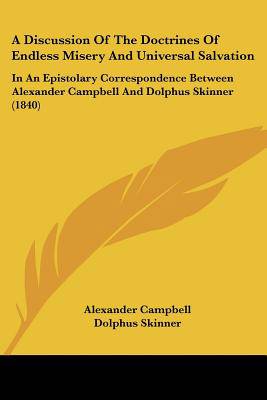
- Afhalen na 1 uur in een winkel met voorraad
- Gratis thuislevering in België vanaf € 30
- Ruim aanbod met 7 miljoen producten
- Afhalen na 1 uur in een winkel met voorraad
- Gratis thuislevering in België vanaf € 30
- Ruim aanbod met 7 miljoen producten
Zoeken
A Discussion Of The Doctrines Of Endless Misery And Universal Salvation
In An Epistolary Correspondence Between Alexander Campbell And Dolphus Skinner (1840)
Alexander Campbell, Dolphus Skinner
Paperback | Engels
€ 51,45
+ 102 punten
Uitvoering
Omschrijving
A Discussion Of The Doctrines Of Endless Misery And Universal Salvation: In An Epistolary Correspondence Between Alexander Campbell And Dolphus Skinner (1840) is a book that explores two opposing theological viewpoints on the concept of salvation. Alexander Campbell and Dolphus Skinner engage in a written debate, exchanging letters in which they discuss their differing beliefs. Campbell argues in favor of the idea of endless misery, which suggests that those who do not accept salvation will be punished eternally. Skinner, on the other hand, advocates for universal salvation, which posits that all people will eventually be saved, regardless of their beliefs or actions. The book provides a detailed examination of these two perspectives, offering readers insight into the theological debates of the time. Published in 1840, A Discussion Of The Doctrines Of Endless Misery And Universal Salvation is an important work in the history of Christian theology and remains relevant to contemporary discussions about salvation and damnation.This scarce antiquarian book is a facsimile reprint of the old original and may contain some imperfections such as library marks and notations. Because we believe this work is culturally important, we have made it available as part of our commitment for protecting, preserving, and promoting the world's literature in affordable, high quality, modern editions, that are true to their original work.
Specificaties
Betrokkenen
- Auteur(s):
- Uitgeverij:
Inhoud
- Aantal bladzijden:
- 436
- Taal:
- Engels
Eigenschappen
- Productcode (EAN):
- 9781104592530
- Verschijningsdatum:
- 13/06/2009
- Uitvoering:
- Paperback
- Formaat:
- Trade paperback (VS)
- Afmetingen:
- 152 mm x 229 mm
- Gewicht:
- 580 g

Alleen bij Standaard Boekhandel
+ 102 punten op je klantenkaart van Standaard Boekhandel
Beoordelingen
We publiceren alleen reviews die voldoen aan de voorwaarden voor reviews. Bekijk onze voorwaarden voor reviews.











